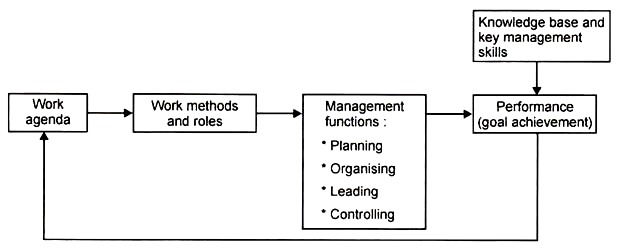This article throws light upon the top five elements of the management process as identified by Steven J. Carroll and Dennis J. Gillen. The elements are: 1. Work Agenda 2. Work Methods and Managerial Roles 3. Management Functions 4. Knowledge Base and Key Management Skills 5. Performance.
Element # 1. Work Agenda:
Kotter undertook a study of general managers of nine companies and concluded that managers contribute towards organisational output through work agendas. A work agenda is a “loosely connected set of tentative goals and tasks that a manager is attempting to accomplish.”
It is the broad outline within which managers guide their actions and those of others. These agendas are prepared for both short-run and long-run job responsibilities. Managers perform various roles to put work agendas into practice, for example, managers act as monitors, spokespersons, negotiators and figurehead to work according to agendas.
Factors Affecting Work Agenda:
Rosemary Stewart identifies three factors that affect work agenda. These are:
(a) Job demands,
(b) Job constraints and
(c) Job choices.
(a) Job Demands:
These are demands of the job that a manager must fulfill. The requirements or demands of the job require different skills to be possessed by managers in varying degrees and are related to the goals and plans of the organisation.
(b) Job Constraints:
These factors limit capacity to work on the job as defined under job demands. While working on a job, managers are constrained by factors internal and external to the organisation. The internal constraints are managers’ abilities, availability of resources, industrial relations etc. and external constraints are legal, political, technological, economic and social factors which limit their capacity to work according to agendas.
(c) Job Choices:
Work agendas are also reflected by the job choices that managers wish or do not wish to undertake. Within the framework of job demands and job constraints, managers often exercise their discretion to carry out certain jobs on their own and delegate the rest to subordinates. They may even take up additional responsibilities with respect to the jobs they retain and delete some of the activities related to their present jobs.
Element # 2. Work Methods and Managerial Roles:
Henry Mintzberg undertook a study to find what managers actually do on the job. He drew conclusions about their:
1. Work methods, and
2. Managerial roles
Work Methods:
Work methods describe the way managers work. The commonly held notion is that managers spend considerable time in planning and organising the activities and solving the organisational problems patiently while actually this is not always so.
The following observations were made by Mintzberg regarding the work methods of managers:
(a) Unrelenting Pace:
It was observed that managers do not spend as much time on planning as is normally expected of them. Rather, they are, most of the times, working at such a fast pace, either attending meetings/conferences or addressing subordinates that they do not have time to have a proper lunch break.
(b) Brevity, Variety and Fragmentation:
Managers have to perform such a wide variety of tasks (from receiving a routine telephone call to deciding about multinational corporate issues) that they tend to be brief over each of the activities. They are often interrupted by other issues before they solve the prior ones. Organisational matters are, therefore, sorted out even after working hours of the office.
(c) Verbal Contacts and Networks:
Managers are assumed to prefer verbal communication with the superiors, peers and subordinates (telephonic conversation or meetings) rather than written communication (through formal reports and letters). This communication is facilitated through networks. A network is “a set of co-operative relationships with individuals whose help is needed in order for a manager to function effectively.”
People helping the managers can be internal and external to the organisation. Individuals internal to the organisation are superiors, peers and subordinates and those external to the organisation are customers, suppliers, friends, lawyers, consultants etc.
Managerial Roles:
“A role is an organised set of behaviours that is associated with a particular office or position.” Managers perform multiple roles which are broadly categorized into three main categories.
Element # 3. Management Functions:
The management process involves achieving organisational goals by carrying out managerial functions of planning, organising, leading and controlling. These functions form the foundation of the basic management process.
Element # 4. Knowledge Base and Key Management Skills:
Managers have a strong knowledge base and managerial skills to effectively set out the work agenda, work methods and managerial roles for carrying out the managerial functions.
1. Knowledge Base:
It refers to knowledge about objectives, plans, policies, organisation structure and other environmental factors (internal and external to the organisation). This knowledge base enables to analyse the company’s internal functioning and relate it with the external environment so that quick and effective decisions can be taken.
2. Management Skills:
Skill is the “ability to engage in a set of behaviours that are functionally related to one another and that lead to a desired performance level in a given area.” Skills are required to perform the functions of management.
Element # 5. Performance:
Performance is the result of various organisational activities. The management process is said to be complete when effective performance is achieved. Drucker defines performance as a combination of effectiveness and efficiency. Together, it refers to achieving the right goals in the right manner.
While effectiveness is choosing the right goals, efficiency is to optimally utilise the resources to achieve these goals. An effective management process aims at achieving the organisational goals efficiently through well laid work agenda, work methods and roles and application of knowledge base and management skills on various managerial functions of planning, organising, leading and controlling.
